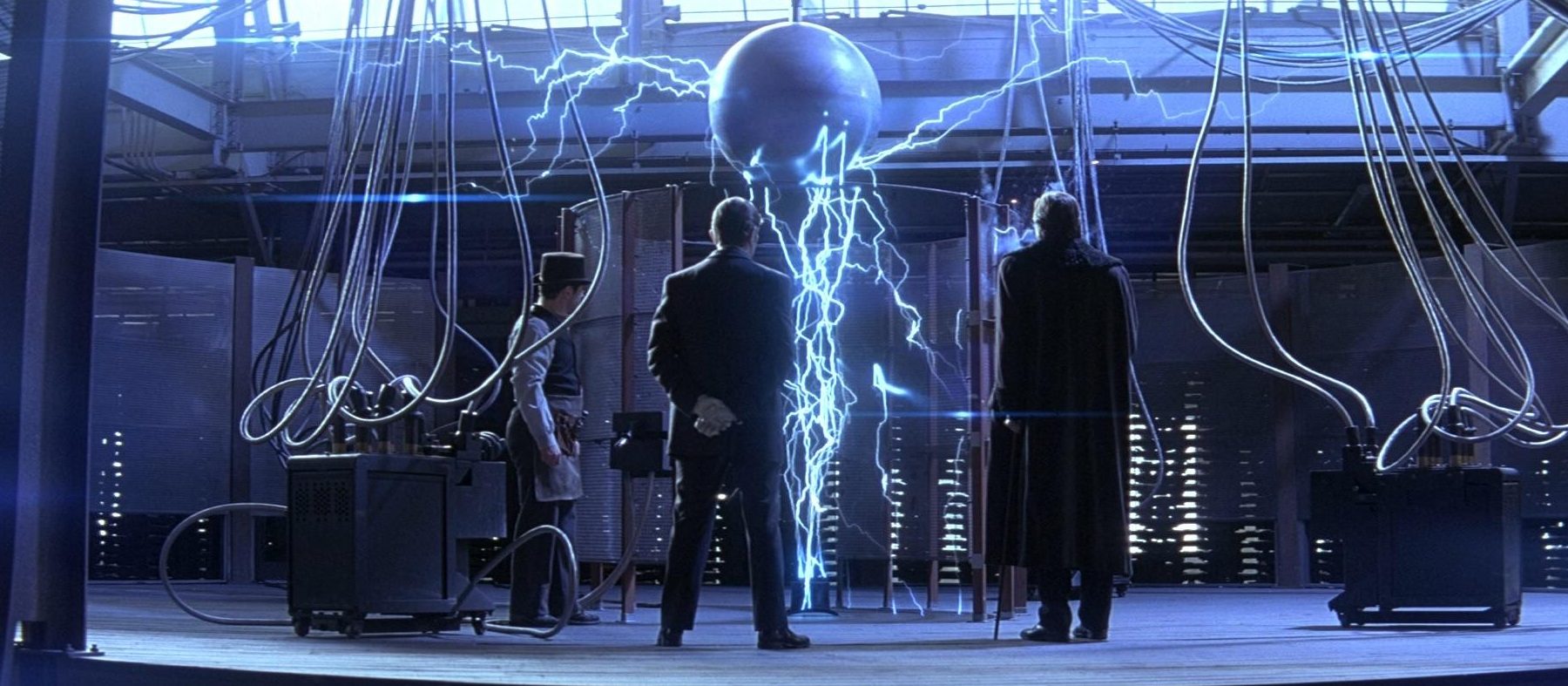
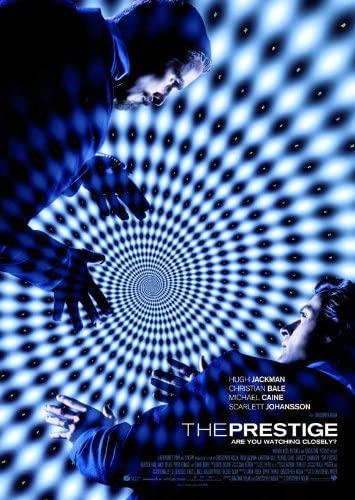
“Now you’re looking for the secret. But you won’t find it because of course, you’re not really looking. You don’t really want to work it out. You want to be fooled.”
In typical Christopher Nolan fashion, the narrative arc of The Prestige is not conveyed to the audience in chronological order. Like the magic tricks that serve as an object of obsession for its main characters, the film is distinguished by its expert sleight of hand and frequent misdirection. A good magician can distract his audience by drawing their attention to something ostentatious while they perform a maneuver undetected. In film, this is a little bit more difficult, because the director controls everything that the audience sees. Instead of visual trickery, Christopher Nolan (and co-writer and brother Jonathan Nolan) engages in narrative trickery, drawing our attention to certain story elements instead of others, so that we are surprised by the outcome but don’t feel that the trick was done cheaply, as we can mentally review and realize the clues were there for us to see. I would argue that the film is potentially better on a second viewing, when knowledge of the key twists allows you to better understand the sacrifices that the characters make in pursuit of their obsessions.
The central plot driver is the relationship of a pair of rival magicians, portrayed by Hugh Jackman and Christian Bale, who engage in dangerous acts of sabotage and one-upmanship, eventually crossing into morally questionable territory as each learns to “get his hands dirty.” Structured around the three stages of the story’s central illusion—the pledge, the turn, and the prestige—the film’s script is remarkably tight as it juggles shifting perspectives, flashback, and dramatic tension as it explores themes of obsession and sacrifice. The legacy of The Prestige is somewhat buried under the mountains of praise for Nolan’s other films, but—The Dark Knight Trilogy aside—it is perhaps his most conventional in terms of storytelling. It is chock full of red herrings and plot twists, but its surprises are drawn from the story itself rather than how it was pieced together like they are in Memento and Inception.
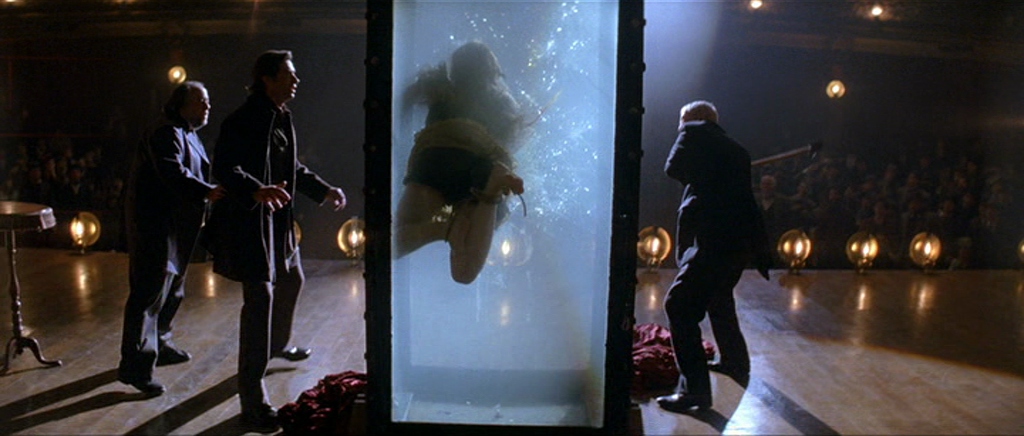
Filmed in between Batman Begins and The Dark Knight, The Prestige utilizes Nolan’s versatile lead man from those films. Alfred Borden (Bale) is a persistent, hardworking shill under the tutelage of an experienced magician (Ricky Jay, a real life magician who trained the two lead men) alongside the classy showman Robert Angier (Jackman) and Angier’s wife Julia (Piper Perabo). Overseeing the entire operation is a seasoned ingenieur named Cutter (Michael Caine). At first, the two aspiring magicians enjoy a friendly rivalry as they attend the show of a Chinese conjurer who makes a fishbowl full of water appear out of nowhere. But their relationship turns hostile when Julia dies while performing a risky trick, her demise potentially caused by Borden’s hubris.
The subsequent long-term duel of wits and wills is brilliantly crafted. Each scene is economically whittled down to its essentials as Nolan sets a breathless pace, jumping between several arcs and points of view with aplomb and switching timelines one hundred and forty six times throughout its two hours! Love interests enter the picture—Angier becomes involved with his assistant Olivia (Scarlett Johansson) and Alfred falls in love with Sarah (Rebecca Hall, whose performance here, while short on screen time, is as impressive as those of the two leading men or Johansson). After a few rounds of sabotaging one another’s promising careers, resulting in the loss of two of Borden’s fingers and the public humiliation of Angier, the two become the bitterest of enemies.
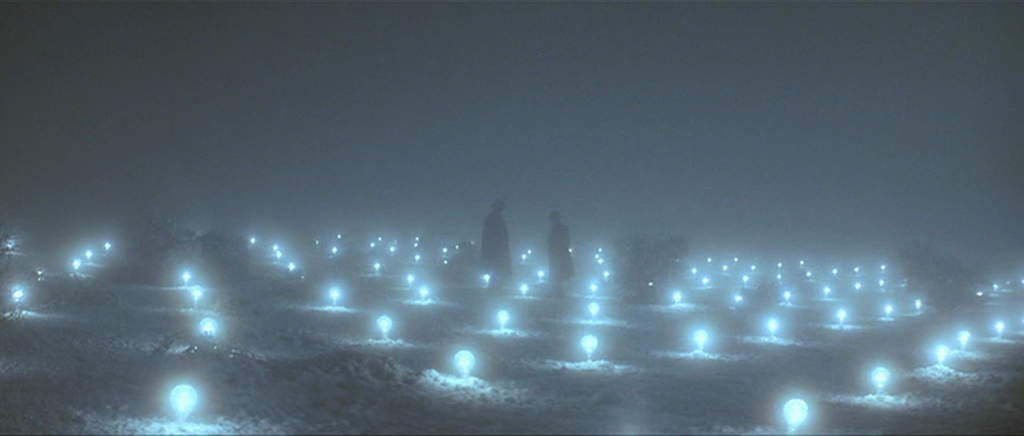
The plot careens around frenetically, but, guided by Nolan’s careful hand, things never get out of control. We visit Nikola Tesla (David Bowie) in America, where he competes with his own rival in scientific discovery, Thomas Edison, in an offscreen competition that parallels the story of Angier and Borden. Tesla tells Angier that he is a slave to his obsessions and that they will one day choose to destroy him, imploring Angier to give up his pursuit while he still has some say in the matter.
We spend time with Borden as he waits to hang for his role in the death of Angier—which we witnessed in the out-of-sequence opening scene. And we spend time with minor characters such as Cutter, Angier’s double Root (also Hugh Jackman), and Borden’s ingenieur Fallon. All of these stories unfold a little bit at a time, and the two related stories, occurring on different timelines, add up to a very compelling whole with a solid dramatic arc. Linking the two men further is a personal diary from each of them which include moments of jaw-dropping plot twists. Both men get their hands on the personal writings of the other, thinking they’ll uncover some great secret, but after hours of pouring through the juicy details, it is revealed to each that the writer knew their work would one day be read by their rival and spoke directly to them. Usually, presenting written work in film is not especially inspiring, but here it works very well.
But here, at the turn, I must leave you, Borden. Yes, you, Borden. Sitting there in your cell, reading my diary. Awaiting your death, for my murder.
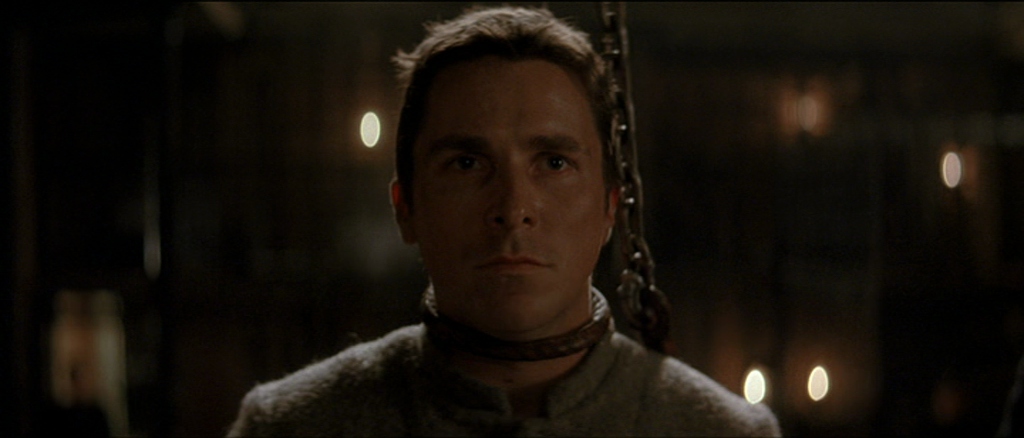
I would argue that the storytelling is almost too concise. Now don’t get me wrong. I get swept up in it every time I watch it. Even as reliant as it is on twists in the plot, it is has treasures in store for repeat viewings. There are moments that stick out on the first viewing—a moment of awful chemistry between Bale and Hall; a scene in which Borden drunkenly celebrates after rescuing Fallon from the clutches of death; Cutter explaining exactly how Borden does ‘The Transported Man’ before the audience has even seen the trick—that deeply reward a second viewing. But if I had to dig at it, I’d say it could use a bit more room to breathe. I understand that the fast pace helps to keep the audience from thinking too much about the upcoming twists, but I think that there are enough of them that a first-time watcher wouldn’t predict them all, and I think the film would work better with a little bit less streamlining. An additional minor gripe is the anticlimactic explanation after the big reveal at the end. Better to let the audience itch for a rewatch than point out how brilliantly the script was executed.
Despite its literary bent, The Prestige is undoubtedly crafted for the popcorn muncher. The script is tight, the cast confined, and the narrative tricks arranged to prioritize thrills rather than call attention to the genius of the filmmaker. In many ways, it is the consummate Christopher Nolan film, exemplifying all of his best traits—manipulation of time, complex storytelling, twists that reward rewatching, themes of sacrifice and secrecy. It’s always a joy to revisit the work of a supremely intelligent filmmaker who also exhibits matchless sensibilities geared toward pure entertainment.
Sources:
Sherlock, Ben. “The Secret Impresses No One: 10 Behind-The-Scenes Facts About The Prestige”. Screen Rant. 28 March 2020.